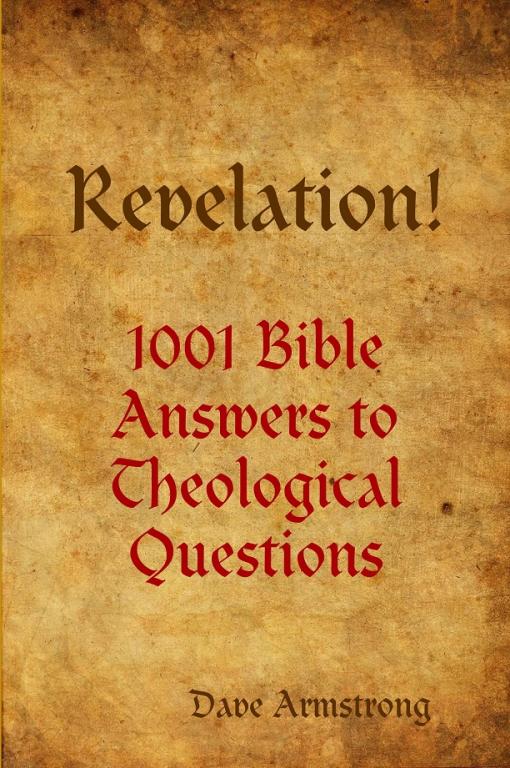
[Book and purchase information]
(9-25-08)
***
These thoughts of mine come from a (requested) critique I did today of a zealous friend’s proposals for Catholic Bible Study and “Sunday School” sorts of methods, that he would like to present to bishops for consideration. I disagreed in some emphases and presuppositions, though I agreed overall, in a broad sense. Though they will appear a bit random and scattered, this material gives readers an idea of how a Catholic (at least this Catholic) approaches Holy Scripture, in relation to the Church and Tradition. It’s an entirely “pro-Bible” approach, but without the erroneous baggage of sola Scriptura and private judgment and other false Protestant notions.
* * * * *
According to my friend Al Kresta, if I recall correctly (a former Christian bookstore manager and pastor), only about 10% of evangelicals regularly attend Bible studies, frequent bookstores, etc. We shouldn’t exaggerate too much how biblically literate they are, and overstate the case. Given the wholesale nonsense we find in many evangelical circles today, this aspect is probably getting worse all the time, too. But I agree that they do much better at it than Catholics. If they have 10% involvement, ours is maybe 1%, so they are, maybe (rough estimate from my own experience) ten times better than us in that respect.
* * *
I think a comprehensive Catholic Study Bible should have scholarly notes and apologetics and devotional, practical elements: put all those things together in one big package rather than create separate Bibles for devotion, scholarship, apologetics, etc.
* * *
If a priest can give a good, understandable homily, he can lead a Bible study. That would be a good test. But who will tell them they give a lousy homily? We don’t want a catch-22 where only uneducated laity teach. Isn’t that self-defeating? They need some knowledge and education in order to be able to teach effectively in the first place. I don’t think it is educational level that is the problem, so much as the fact that laypeople are fired up and motivated and orthodox, whereas too many clergy (for whatever reasons) lack those qualities. When priests have that pride that they can do it all, and no laypeople can help at all in teaching, usually it is a liberal mentality and the good ole clergy-laity dichotomy that the Church has urged against in many documents.
* * *
Women, especially, resonate with a more “practical / daily living” approach, but it cant become too dominant, lest doctrine be minimized. Also, we must guard against the danger of philosophical pragmatism, which runs rampant in evangelicalism with the trendy, “give-the-people-the-service-they-like” nonsense that many evangelicals themselves are vehemently criticizing. The same could happen to us if we arent careful. Satan would love that.
* * *
I actually like the different day approach better, rather than Sunday school, because people seem to want to do things for shorter periods of time rather than long spaces of time stuck together. One has to determine how much to cater to the current preferences of human beings. If we want to emphasize practicality, then we’ll have to bend somewhat to peoples felt needs: whether or not we accept them in and of themselves as legitimate and defensible. This is a large part of the task. The whole notion of applying this stuff to peoples everyday lives also has relevance to the very structure of the programs suggested, which also have to be applied to peoples everyday lives. Much as I immensely admire John Wesley (whose methods you seem to be largely suggesting), it is not at all certain that his methods are the best ones for all time, in all conceivable circumstances. Thats entirely debatable, just as any other method, as opposed to doctrine, is. Chances are that the best, most effective methods will differ in every age or era.
* * *
Id say emphasize the Wednesday night thing but not that and Sunday School, because it probably wont work, whatever its intrinsic merits are. If the thing doesn’t work and bring people out, it’ll fail in its purpose even if it is the best method in the world. It is an acknowledgment of the reality of how people are in 21st-century America. I’m as idealist as anyone, but we have to face facts of the present situation, too.
* * *
Do all people want to do meet in small groups, or have that need? Sometimes yes, other times not, and then we have to incorporate folks who prefer a less personal, more standard classroom environment; back to the question of felt needs, that are not all the same. Just the gender difference alone is a vastly different approach and collection of needs.
* * *
Traditionally, Catholics got plenty of fellowship through groups like Knights of Columbus and so forth. Also, parishes were neighborhoods in a sense much stronger than we see today. My own family goes to a church downtown, that has nothing to do with my neighborhood at all. And we do that because it is orthodox and traditional. Suburbs themselves are far less communitarian than the cities where Catholics usually congregated (often in ethnic conclaves). Now the sociologist from my college background is speaking! These factors have a lot to do with the lessening of fellowship: not simply the lack of Protestant methods. This ought to be noted, lest someone think that Catholics have always been deficient in these regards, whereas I highly doubt that that was the case. We cant project our time onto all of Catholic history. Even 50 years ago it was vastly different in the social sense.
* * *
My own kids go to three thriving teen groups at a Catholic parish nearby (not our own). This is providing them with tons of fellowship and teaching, too, and retreats and social outreaches. Its a positive example of what can be done. This works because of the desire that teens have to fellowship (and to meet mates). But that doesnt always transfer to older groups. The singles group where I met my wife Judy in the Assemblies of God was of a similar nature. They work because of the strong needs of that age group to congregate and do fun activities together, with fellow Christians. At least it is something that is happening in Catholic circles that has some excitement and participation in it. My kids are greatly benefiting from it.
* * *
Bible memorization is not an unmixed blessing. Sometimes it can encourage a fundamentalist-type prooftexting mentality that tends to go towards the Protestant sola Scriptura approach and neglect context.
* * *
Despite all of this biblical emphasis in Protestantism, what overall result has been produced? We see an evangelicalism increasingly fractured and soaked-through with a number of false notions, such as privatization, subjectivism, pragmatism, faddism (that I was reading about 25 years ago in Schaeffer and Os Guinness), that cannot achieve doctrinal unity, nor can it even achieve a consensus on issues like abortion, divorce, contraception, et al. Catholicism has avoided much of that nonsense and has correct doctrine and moral teaching. In other words, people can know the Bible backwards and forwards, but still interpret it wrongly and arrive at damnable conclusions on any number of issues.
In a sense, then, it is far better (given a hypothetical stark choice) to have a Catholic simply accept Church teachings on faith, than a Protestant who knows his Bible like the back of his hand, but is wrong on many important issues, even to the extent of endangering his soul, and has no or very little sense of the history of Christian doctrine. Thats why my own personal belief is that solid catechetics and apologetics are relatively a lot more important than Bible study per se, because it has the built-in doctrinal standards and interpretation of the Bible according to the Church. All this strong, very Protestant-like emphasis you put on Bible study, I would put on catechesis and apologetics. Bible study can certainly be part of that, but I wouldn’t place it as the highest priority. And this has been proven in practice, by dioceses that have good teaching and solid bishops, and by parishes with an apologetic emphasis, that are growing by leaps and bounds. The apologetics movement is a revival right now. Its working. So it would be good to include it in this overall mix.
* * *
It’s fine, but is it really necessary to read one’s Bible along with the priest during his homily? Reading is not obviously preferable to hearing. Hearing things is just as effective a communication (and this is presupposed in biblical passages about oral tradition), though on the other hand, Ive heard it said that the more senses one involves, the better they remember. One could argue, then, that it would be a memory aid, if nothing else. When Paul and Peter preached, people weren’t following along with Bibles.
* * *
I think the goal should be a deeper one: to enamor people with doctrinal Catholic truth, however they receive it. That can be achieved by homilies or good Bible teaching, or traditional catechetics, or apologetics, RCIA, adult formation classes, or through more devotional practices that have a secondary doctrinal emphasis. I have no objection whatever to any Bible study. My own emphasis is obviously overwhelmingly biblical. I’m just saying that it is not necessarily an absolute requirement to read the Bible while at Mass. One can encourage it without making out that it is a necessity, or that those who prefer not to do it are somehow second-class simply because they are able to effectively hear a passage without also reading it (like a number of emphases in evangelicalism make people feel). Its a matter of good and better, not good and bad. If it gets too legalistic, it’ll fail and these goals of increased Catholic biblical literacy wont even get off the ground.
* * *
Protestants are reading the Bible but they don’t arrive at doctrinal truths in many many cases. To the extent that one disconnects Bible study from Catholic dogma and guidance, to that extent, there will be more error and more people leaving the Church, because they might adopt the Protestant principle private judgment. Its a danger that has to be vigilantly avoided.
* * *
There must be some reason that the Church in her wisdom has arrived at certain methods in the Mass. It would be good for us to fully understand those before setting out on some reform of the Mass. Chesterton wrote in The Everlasting Man: “It is chiefly interesting as evidence that the boldest plans for the future invoke the authority of the past; and that even a revolutionary seeks to satisfy himself that he is also a reactionary.”
We can appeal to Methodist Past (Sunday School, that John Wesley began) and Evangelical Present (various “people-friendly” methods and tactics, but how about Catholic Past? It is not true, I highly suspect, that the Catholic Church has always failed to properly teach the Bible and never at any time or place did it right. Thats why I think we need to do an intensive study of these aspects through Church history and look for a model that worked in the past or in some other culture today, that was fully Catholic.
* * *
Given a theoretical choice, Id be much more happy about Catholics being comfortable with Catholic dogma in its entirety in their hands (as opposed to the Bible) and an understanding of same and ability to share and defend it. That can be achieved through many means, including the Bible but also Sacred Tradition and Church proclamations and philosophy and apologetics. To share and defend Catholic truth is also more than simply citing biblical texts (much as I do that myself). It involves reason and an understanding of history and the Catholic Mind, and systematic theology. All of this comes through teaching that is not confined to the Bible itself; yet we can underestimate the importance of these things, if we place overwhelming emphasis on Bible study. Its a very complex discussion. Ive been accused more than once of applying sola Scriptura methods in my apologetics. I don’t at all; they don’t get it (they presuppose that any Bible citation at all entails sola Scriptura, which is ludicrous), but the very objection illustrates the confusion between the Protestant and Catholic ways of viewing authority.
* * *
Reading the Bible along with the priest shouldn’t be an absolute requirement. To do so looks down on oral teaching, which is impossible to do based on the Bible alone. All the oral teaching in the NT was done without folks sitting with a NT in their hands while they heard it. This oral tradition had every bit as much authority in and of itself as the later written Bible did. That being the case, it is impossible to say that listening to this inspired word being read today is insufficient in its purpose if a person isn’t also physically reading it.
If we want to get really technical, it is not at all clear to me that even Bible memorization is required. I don’t try to memorize the Bible; I try to habitually use it and study it. Thats two different things. If a person wants to memorize large parts of it, great. More power to them. Is it necessary for all to do? No, not at all. It is necessary again to understand the Catholic faith in its entirety, so that it becomes part of us, and so that we can effectively share it and give reasons for why we believe what we believe. All of that requires far more than mere Bible memorization. You can quote a Bible verse at a person but as soon as he asks why you apply it the way you do then you have to go to other Bible passages and to reason and Tradition. The good Catholic apologist can literally wipe the floor with a Bible-soaked fundamentalist Protestant in debate because the latter quite often has no inkling of his premises and how to consistently apply biblical teaching to doctrine.
* * *
I would highly recommend for anyone pondering this topic, that they read Cardinal Newman’s On the Inspiration of Scripture, available online.
* * *
I would be less inclined to tout evangelicals for understanding of the incorporation of the Bible into the full Catholic life. Yes, they do manage to get people enthused about the Bible, but that is only about 25% of the battle, in my opinion, per my comments above. If we’re simply talking about Bible enthusiasm and familiarity, then sure, of course: evangelicals do far, far better than Catholics at the present time. If we’re talking about an overall passing on of the full, biblical, Catholic truth, on the other hand, we are better, at least in terms of what we actually teach (but that is the problem: getting it to the people so they can benefit from all this truth). Truth and fullness of truth are antecedent to proclamation and method.
* * *
It’s somewhat like the debate in the 16th century, where Protestants cared relatively little for the accuracy of translation, and simply wanted to pass out Bibles by the millions. They reasoned that this would make people better Christians, or (depending on theology), Christians, period (i.e., “saved,” in the evangelical sense). In some cases, yes, but the overall result was a rampant sectarianism and thus, theological relativism in many areas. This is one of the points I’m trying to make: simply having more Bible: reading, memorizing is not an unmixed good, because of human sin and what people too often wrongly do with the Bible (which is itself wonderful). I’m not so much disagreeing with Catholic Sunday School or a concentrated Bible reading program, as I am taking it to a deeper, more presuppositional level (as I often do: it is the socratic method, after all, that I love).
* * *
You mentioned a church that I attended for four years, and claim that Bible study attendance was 80% of the congregation. I’m not sure at all that the numbers were that high, but let’s assume that they were. Did that mean that these people were mature Christians, with a deep understanding of Scripture? Hardly. You had mushy, milky preaching from the pulpit for the most part, and infatuation with Jim Bakker and PTL et al (before the scandal hit). Kenneth Copeland was not rebuked from the pulpit, even though his errors were believed by many in the church. I rarely learned anything from the sermons (and I wanted to, believe me). Dick Bieber’s sermons at Messiah Lutheran had infinitely more meat and challenge in them. You had the stupid “name-it-claim it” doctrine running rampant. I went through this all the time, trying to reason with friends of mine in the singles group I was in. We personally knew people who didn’t brush their teeth, or denied that they had a cold, because that was a bad “claim.” You had ridiculous “prophesying” during services, and people going up front week after week to get “saved.” Error was all over the place, so a lot of good tons of Bible study did, if they were not being disabused of their obvious errors. The use of the Bible is only as good as the knowledge and orthodoxy of those who are teaching it or reading it.
* * *
Part of my analysis is a warning based on past history and the influence on Catholics that Protestantism already has. It is a matter of human behavior (sometimes). I’m all for the Bible Study plan in its broad outlines, but unless we are aware of the dangers involved, then we’ll be in for a big disappointment. You don’t just rush into a thing without proper, sombre analysis. Per the Chesterton citation I gave, I think this sort of thing has to be undertaken with a deep knowledge of how these things were approached in the history of the Church. We can’t just ape Protestant methods, and naively think that we won’t have any of the huge problems that they themselves have had, largely because of those methods. There is an overlap. We can give our people Church and Tradition, but we have to be very careful not to fall into Protestant assumptions that are hostile to Catholicism, because it is very easy to do: those being often the more natural human responses and not to often the most reasonable or orthodox ones.
* * *
I don’t want anyone to be afraid; only wise and properly prepared and aware of excesses that have already occurred in Protestant circles. We can learn from Protestant mistakes as well as their successes. Any methodology can be critiqued. It’s not written in stone. This ain’t doctrine; it’s how to best promulgate doctrine and love and use of the Bible. Certainly honest men can differ about how to do that. I differ in some respects with other equally orthodox Catholics, and my overwhelming emphasis in my own apologetics is indeed the Bible. In other words, no one (who is at all familiar with my work) can possibly claim that I don’t care about Bible reading and Bible study. My arguments are permeated with it from top to bottom. I could even say that I love nothing more. I’m simply offering constructive advice as I see it.
* * *
I’m not advocating not reading the Bible individually. Not at all! I fully agree with all the positive statements in that regard that the Church has made. But it has to be in the overall context of Catholic teaching (a thing that these same documents highly stress, for many of the same reasons I am giving). Arguably, many Catholics are not thinking sufficiently “Protestant” with respect to Bible reading and study and reverence (and one could rightly contend that they should because the evangelical Protestants have done better at that in practice). It is not inconceivable, however, that some aspects of Catholic thinking about the Bible may not be sufficiently Catholic. That’s true — or potentially true — of all of us at all times. We have to be very self-consciously aware that we are in conformity with the Mind of the Church.
That’s why I recommended reading Cardinal Newman on the topic: a man who was a fervent Protestant and then became a great Catholic thinker. That’s the type of thing that will allow us to draw from the best in both traditions. But we can’t just uncritically draw from Protestant successes in limited areas without giving past Catholic practice in this same regard its due, and thoroughly understanding its internal justifications. A Catholic should read, for example, the debates between St. Thomas More and William Tyndale, which illustrate the different ways that Protestants and Catholics approach the Bible.
* * *
I deny the whole root assumption that Protestants have, that every doctrine, even in particulars, has to have explicit biblical proof (which a Catholic notion of material sufficiency doesn’t require), etc. It is the place of the Bible in the overall mix that they get quite wrong, and if we try to imitate them too much, we could possibly fall into the same error, almost despite ourselves. Bishops’ fears about this are quite justified, based on historical precedent. There is a proper middle ground in all this.
* * *
I think we should ignore the clergy/laity distinction altogether when it comes to Bible study. We should simply pick the best man or woman to be found in the parish for the task. If that is the priest, he should do it. If he is too busy, or a layperson can do a better job, then they should do it. I don’t see why we have to consciously restrict it to the laymen.
* * *
Catholic Bible study has to be placed in an overall context of traditional catechetics, apologetics, prayer meetings, devotional and spiritual elements and activities, eucharistic devotion: the whole nine yards.
* * *
I’m not against Bible memorization altogether, or indeed any kind of memorization, but only its insufficiency if it is done by “rote” without awareness of the larger principles embodied by the things memorized, or for mere “prooftexting” purposes, without sufficient background knowledge or awareness of systematic theology and the dogmas of the Church. If anyone reads what I wrote above about memorization very carefully, they’ll see that I made many qualifications, and was not against the thing itself. Memory techniques are especially good for children (to use one example) because much of their learning in the very early stages is rote, anyway.
* * *
I was simply trying to point out that there is more to it than merely memorizing things. It is also not absolutely necessary to know passages by memory, as long as one has a general view of what the Bible and individual Bible books teach. We can look up things. We have many helpful resources now. We don’t have to rely strictly on our own memories. This holds true much more so in cultures like our own, that are much more oriented to the written word, as opposed to entirely oral cultures that didn’t even have writing, like (most of) the American Indians and others.
***













